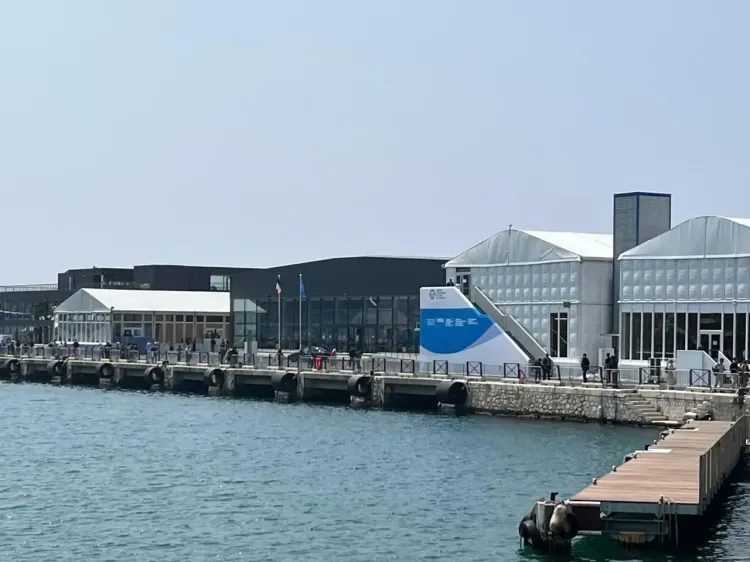How Can Nations Leverage UNOC for Ocean Sustainability?

Synopsis
Key Takeaways
- UN Ocean Conference presents a critical opportunity for nations.
- Urgent need for enhanced marine ecosystem management.
- Global agreements can ensure sustainable ocean use.
- Collaboration across nations is essential for ocean conservation.
- Innovative solutions are required to address coral reef protection.
Nice (France), June 10 (NationPress) With only five years remaining to achieve the global "30 by 30" conservation target and an urgent requirement to enhance the management of marine ecosystems, the ongoing 2025 UN Ocean Conference (UNOC) offers a significant opportunity for nations to advance international agreements that can guarantee the protection and sustainable utilization of the ocean and its resources for future generations.
Experts caution that since the signing of the 2015 Paris Agreement, the world has introduced energy into the ocean equivalent to almost two billion atomic bombs, similar to "Little Boy".
The consequence is that, by 2025, the ocean heat content to a depth of 2000 meters was approximately 104 zettajoules greater than in 2015, which is comparable to about 1.7 billion atomic bombs, translating to roughly five bombs per second.
Global daily sea ice reached an unprecedented low in February 2025.
The maximum extent and volume of sea ice in both 2023 and 2024 were also significantly below the levels of previous years.
It appears that Antarctic sea ice may have entered a completely new, reduced state, as the winter maximum sea ice extents for 2023 and 2024 were dramatically below historical averages.
The Antarctic sea ice metrics for 2025 also fall well below historical averages for both extent and volume.
The summer minimum extents of Antarctic sea ice from 2022 to 2025 were the lowest ever recorded, around half of the average, and the low in 2023 was estimated to be a phenomenon that could only occur once in 2,650 years without climate change.
In March 2025, Arctic sea ice reached its lowest volume on record after decades of decline.
Sea levels set a new record high in 2024, with the rate of rise accelerating since 2015.
Even if we begin now, reversing sea level rise could take centuries to millennia.
During the third United Nations Ocean Conference (UNOC3) held in the southern French city of Nice, two prominent marine conservation coalitions in the Mediterranean—Med Sea Alliance and Together for the Med—representing over 70 local and regional organizations, have united to urge world leaders to hasten actions for marine conservation and restoration in the Mediterranean.
"This is not just about preserving nature: it's about restoring equilibrium between humanity and the planet," stated Karlijn Steinbusch, Director of the Med Sea Alliance.
"We already possess regional commitments. We understand that marine protection is beneficial. What we require now is political action—more robust, well-funded, and more impactful marine protection."
"The sea does not recognize borders," remarked Margaux Janin, Coordinator of Together for the Med.
"We must amplify all voices, fostering collaboration that transcends geographical boundaries. Scientists, fishers, and NGOs are united in their demand for a healthy future for our shared waters."
The Mediterranean Sea is a crucial component of the region's environmental stability, food security, and socio-economic resilience.
Its waters host remarkable biodiversity—over 17,000 marine species, which represent 18 percent of the known species globally—and sustain the livelihoods of millions, especially in coastal communities.
Fisheries and marine aquaculture in the Mediterranean and Black Sea region contribute to over 700,000 jobs and generate more than €20 billion in revenue annually, highlighting the sea's tremendous ecological and economic value.
Unfortunately, the Mediterranean is warming at a rate three times faster than the global ocean average, jeopardizing not only biodiversity but also the livelihoods of millions who rely on its resources.
In this light, UNOC3 serves as a crucial platform for uniting a variety of stakeholders—from national governments and marine scientists to small-scale fishing communities and NGOs—around solutions grounded in evidence, demonstrating that regional cooperation can foster both ecological recovery and effective community management.
At the UNOC, the G20 Coral Research and Development Accelerator Platform (CORDAP) and The Earthshot Prize recently announced the commencement of a joint global Coral Innovation Search aimed at accelerating solutions for coral reef protection and restoration.
This new strategic partnership was unveiled aboard OceanXplorer, a research and media vessel operated by OceanX, during a high-profile side event at the UNOC.
The event gathered global figures from venture capital, corporate, investment, and philanthropic sectors—including musician and ocean advocate James Blunt and environmentalist Philippe Cousteau Jr.—to discuss the urgent need to mobilize resources and innovations to ensure a future for coral reefs.
On the inaugural day of the UNOC, the High Seas Alliance celebrated the progress made towards a historic number of ratifications for the High Seas Treaty, which have now been deposited, bringing the treaty closer to the essential threshold of 60 ratifications required for it to take effect.
During a special event dedicated to the High Seas Treaty organized for the conference, 18 nations deposited their instruments of ratification.
Countries such as Guinea-Bissau, Liberia, Cote d'Ivoire, Solomon Islands, Tuvalu, Malta, Vietnam, Jamaica, Albania, Bahamas, Belgium, Croatia, Denmark, Fiji, Mauritania, Vanuatu, Greece, and Jordan have now joined the 31 countries and the European Union that had already deposited their ratifications prior to the conference.
This brings the total number of ratifying countries to 49.
Additionally, 17 more nations signed the treaty, indicating their intention to ratify it in the future, increasing the total number of signatories to 134.
The treaty, formally known as the Agreement under the United Nations Convention on the Law of the Sea for the Conservation and Sustainable Use of Marine Biological Diversity in Areas Beyond National Jurisdiction (BBNJ Agreement), was officially opened for signing and ratification in September 2023.
France, co-hosting the UN Ocean Conference with Costa Rica, has prioritized accelerating treaty ratification as a key deliverable and has played a significant diplomatic role in advancing progress ahead of the conference.
(Vishal Gulati can be contacted at vishal.g@ians.in)









